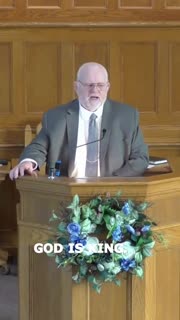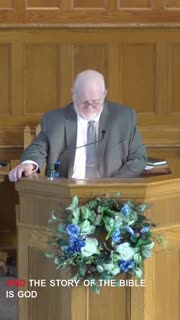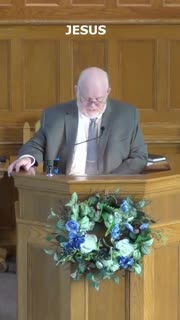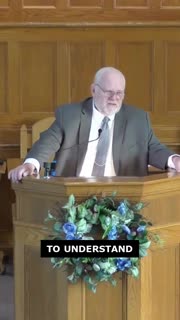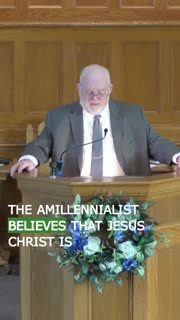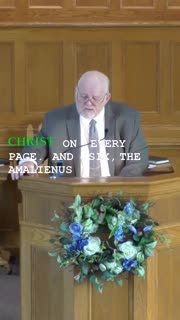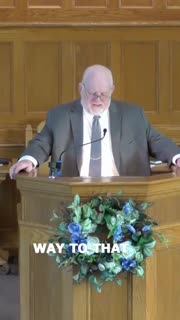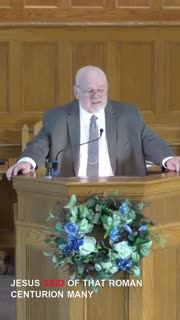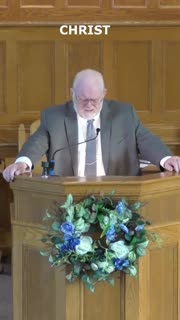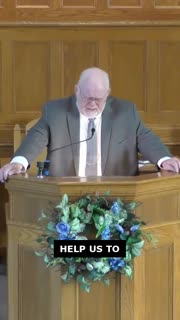Understanding the Kingdom of God and Christ's Return
Devotional
Sermon Summary
Bible Study Guide
Sermon Clips
1. "God is king. Adam's sin and its consequences did not dethrone God, the God of the universe. With the fall of mankind into sin, the willing subjection of mankind, in fact, all of creation no longer existed in God's world. God continued to rule over rule, even in the presence of sin. And so God the Father continued to be the sovereign king or ruler over all history, but because of sin, nothing and no one acknowledged or submitted willingly to his authority." [09:39] (39 seconds)
2. "And the story of the Bible is God recovering and restoring all his creation to its willing submission and worship of God, the God of the universe. God, through a mediatorial kingdom, an intervening kingdom, which he brought to pass, brings to pass in history. And so in Adam's fall, paradise was lost, but through Christ, paradise is regained and restored. That's the story of the Bible." [10:53] (29 seconds)
3. "Jesus Christ is presently Lord of lords and King of kings. The promised kingdom of the Old Testament was inaugurated. Jesus is Lord. And yet the kingdom of Jesus Christ will not be fully manifested until the return of Jesus." [12:08] (16 seconds)
4. "To understand the purposes of God, the promises of God will ground you and strengthen you and affirm you as you have hope in what God has promised to do. And if you misunderstand these matters, or you're confused about these matters, will be to the degree that you cannot, you will not have the hope, the confidence, the assurance and peace that you could have had, had you understood these things rightly." [20:13] (30 seconds)
5. "The amillennialist believes that Jesus Christ is now ruling as the king over the kingdom of God, although his kingdom will be manifested before everyone to see it at the second coming when he puts down all rebellion. Every eye will see him. Every tongue will confess. Every knee bow. Confess Jesus is Lord to the glory of the Father." [01:00:52] (19 seconds)
6. "The amillennialist understands the Old Testament prophets to be veiled as to their true meaning, and they can only be understood when one sees Christ proclaimed through them, even as the New Testament writer provide an inspired interpretation of the prophets. The dispensationalist claims they interpret the Old Testament prophets literally. The amillennialist argues that the Old Testament means what it says, but the New Testament says what it means. You interpret the Old Testament in the light of the New Testament." [01:02:32] (35 seconds)
7. "The Old Testament is filled with types, which give way to their anti-types in the New Testament. Just as the kingdom of God was promised in the Old Testament came to realization with the life and ministry of Christ, so the church too was promised in the Old Testament but came into realization with the coming of Christ." [01:03:52] (20 seconds)
8. "Jesus said of that Roman centurion many will come from the east and the west gentile lands and sit down together with Abraham Isaac and Jacob in the kingdom one people of God is what the Lord Jesus taught." [01:03:52] (13 seconds)
9. "Jesus Christ you are lord of lords and king of kings and that although you were rejected it was the very means of your your your obedience on the death of the cross that resulted in the father highly exalting you giving you a name above every name you indeed are lord of lords and king of kings ruling over this glorious kingdom of god of which we are citizens of the kingdom of god and the kingdom of christ." [01:06:51] (26 seconds)
10. "Help us to understand these things clearly our god and live in the light of the truth of these give your people assurance and peace and confidence our god as we live in a very unsettled a difficult time in history may we look forward when confidence our god king jesus you were in on the throne and you were controlling the events of history taking place in the past even now bringing judgment upon your enemies but thankfully bringing salvation to your people the ones that the father had given you from eternity." [01:06:51] (32 seconds)
Ask a question about this sermon
2. "And the story of the Bible is God recovering and restoring all his creation to its willing submission and worship of God, the God of the universe. God, through a mediatorial kingdom, an intervening kingdom, which he brought to pass, brings to pass in history. And so in Adam's fall, paradise was lost, but through Christ, paradise is regained and restored. That's the story of the Bible." [10:53] (29 seconds)
3. "Jesus Christ is presently Lord of lords and King of kings. The promised kingdom of the Old Testament was inaugurated. Jesus is Lord. And yet the kingdom of Jesus Christ will not be fully manifested until the return of Jesus." [12:08] (16 seconds)
4. "To understand the purposes of God, the promises of God will ground you and strengthen you and affirm you as you have hope in what God has promised to do. And if you misunderstand these matters, or you're confused about these matters, will be to the degree that you cannot, you will not have the hope, the confidence, the assurance and peace that you could have had, had you understood these things rightly." [20:13] (30 seconds)
5. "The amillennialist believes that Jesus Christ is now ruling as the king over the kingdom of God, although his kingdom will be manifested before everyone to see it at the second coming when he puts down all rebellion. Every eye will see him. Every tongue will confess. Every knee bow. Confess Jesus is Lord to the glory of the Father." [01:00:52] (19 seconds)
6. "The amillennialist understands the Old Testament prophets to be veiled as to their true meaning, and they can only be understood when one sees Christ proclaimed through them, even as the New Testament writer provide an inspired interpretation of the prophets. The dispensationalist claims they interpret the Old Testament prophets literally. The amillennialist argues that the Old Testament means what it says, but the New Testament says what it means. You interpret the Old Testament in the light of the New Testament." [01:02:32] (35 seconds)
7. "The Old Testament is filled with types, which give way to their anti-types in the New Testament. Just as the kingdom of God was promised in the Old Testament came to realization with the life and ministry of Christ, so the church too was promised in the Old Testament but came into realization with the coming of Christ." [01:03:52] (20 seconds)
8. "Jesus said of that Roman centurion many will come from the east and the west gentile lands and sit down together with Abraham Isaac and Jacob in the kingdom one people of God is what the Lord Jesus taught." [01:03:52] (13 seconds)
9. "Jesus Christ you are lord of lords and king of kings and that although you were rejected it was the very means of your your your obedience on the death of the cross that resulted in the father highly exalting you giving you a name above every name you indeed are lord of lords and king of kings ruling over this glorious kingdom of god of which we are citizens of the kingdom of god and the kingdom of christ." [01:06:51] (26 seconds)
10. "Help us to understand these things clearly our god and live in the light of the truth of these give your people assurance and peace and confidence our god as we live in a very unsettled a difficult time in history may we look forward when confidence our god king jesus you were in on the throne and you were controlling the events of history taking place in the past even now bringing judgment upon your enemies but thankfully bringing salvation to your people the ones that the father had given you from eternity." [01:06:51] (32 seconds)
